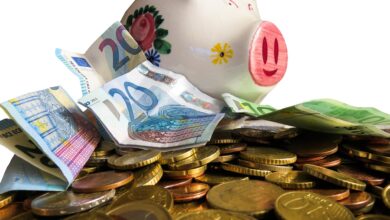5 Bad Money Habits You Need To Quit Right Now

Your bank account is probably crying right now, and chances are, you’re the one making it weep.
We all know that one person who earns twice what we make but somehow always ends up broke by the 20th of every month.
Plot twist: that person might actually be you. And before you blame your salary, your boss, or the economy.
Let me hit you with some truth: your money problems likely stem from habits you’ve been nurturing for years without even realizing it.
I’ve spent years studying financial behaviour, and honestly? The patterns are painfully predictable.
People mess up their finances in the same five ways, over and over again. But here’s the good news: once you spot these habits, you can actually fix them.
So, grab your coffee (or wine, no judgment), and let’s talk about the money mistakes that are silently destroying your financial future.
What Are Bad Money Habits?
Think of bad money habits as those sneaky little behaviours that seem harmless in the moment but collectively wreck your financial foundation.
They’re like termites eating away at your house; you don’t notice the damage until your floor collapses.
Bad money habits are repetitive financial behaviours that consistently work against your financial well-being.
They’re the decisions you make on autopilot that drain your resources, prevent wealth accumulation, and keep you stuck in a paycheck-to-paycheck cycle.
Here’s what makes these habits so dangerous: they feel normal. You’ve been doing them for so long that they’re just part of your routine.
You grab that daily $6 latte without thinking.
Swipe your credit card for a “small” purchase because it’s “only” $50. You skip this month’s savings contribution because you’ll “definitely do it next month.”
Sound familiar? 🙂
The tricky part is that many people don’t even realise they have these habits.
You might think you’re managing your money just fine while simultaneously wondering why you can’t seem to get ahead financially.
That disconnect? That’s the bad habit doing its job, staying invisible while causing maximum damage.
From my experience working with hundreds of clients, I’ve noticed that financial awareness is the first casualty of bad money habits.
People become numb to their poor choices because they’ve normalized them.
Your brain literally stops flagging these behaviors as problems.
How Do You Break Bad Money Habits?
Here’s the thing about breaking bad money habits: you can’t just stop doing something.
You need to replace it with something better. It’s basic behavioral psychology, really.
The replacement strategy works because your brain loves patterns.
When you remove a habit without substituting it, you create a void that your brain desperately wants to fill, usually with the same bad habit you just quit or something equally destructive.
Let me give you a practical example.
Say you have a habit of online shopping when you’re bored (guilty as charged, by the way).
You can’t just stop being bored. Instead, you need to replace that shopping trigger with a different response.
When boredom hits, maybe you take a walk, call a friend, or work on a side hustle that actually makes you money instead of spending it.
The three-step process I recommend to my clients is simple:
- Identify the trigger – What situation, emotion, or time of day makes you engage in the bad habit?
- Replace the action – Find a financially positive behaviour to do instead when that trigger hits
- Track the results – Monitor your progress and celebrate small wins
Breaking bad money habits requires honest self-assessment.
You need to look at your bank statements without making excuses. Track your spending for at least 30 days.
The data doesn’t lie, even when you want it to.
One more thing, accountability accelerates change. Tell someone you trust about the habit you’re trying to break. Share your goals.
This external pressure actually helps your brain take the change more seriously.
When it’s just you versus your habit, your habit usually wins.
When it’s you plus an accountability partner versus your habit, your odds improve dramatically.
Why Bad Money Habits Hurt Your Finances

Let’s talk about compound effects. You know how compound interest can make you rich over time?
Well, bad money habits work the same way, except they make you poor.
Every bad financial decision you make today reduces your options tomorrow.
That impulse purchase doesn’t just cost you the purchase price. It costs you the potential returns you could have earned by investing that money.
Also, it costs you the emergency fund buffer you didn’t build. It costs you the peace of mind you could have had.
Here’s a real number that’ll wake you up: If you spend just $10 daily on unnecessary stuff (coffee, snacks, random Amazon purchases), that’s $3,650 per year.
Invested in an index fund averaging 10% annual returns, that money becomes approximately $23,000 in 10 years and $65,000 in 20 years. Still think that daily latte is “just $5”?
Bad money habits create a vicious cycle.
They prevent you from building savings, which makes you vulnerable to emergencies, which forces you into debt, which creates stress, which makes you more likely to engage in emotional spending, which drains your resources further.
See how that works? :/
The psychological toll is equally devastating. Financial stress affects your health, your relationships, your job performance, and your overall quality of life.
Studies show that money problems are the leading cause of stress in relationships and a major contributor to divorce rates.
From a professional standpoint, I’ve watched bad money habits destroy people’s dreams. Want to start a business?
You need capital. Want to retire comfortably? You need decades of consistent saving and investing.
Want to send your kids to college? That requires planning and accumulation.
Bad money habits make all of these goals exponentially harder or completely impossible.
Bad Money Habits To Drop
If I had to create a hierarchy of financial destruction, impulse buying would sit right at the top of the pyramid.
This single habit has probably destroyed more financial plans than any other behaviour.
Impulse buying is the crack cocaine of money habits; it gives you a quick high followed by crushing regret and depleted resources.
The retail industry literally spends billions studying human psychology to trigger your impulse buying response.
Those strategically placed items near the checkout.
The “limited time offers”? The “You might also like” suggestions? All designed to hijack your rational brain.
The scariest part about impulse buying is that it scales with your income. Make $30,000 a year?
You’ll impulse buy $30 items. Make $300,000 a year? You’ll impulse buy $3,000 items.
The percentage of income wasted remains roughly the same unless you consciously intervene.
Creating and sticking to a budget is your first line of defense.
And before you groan about how boring budgets are, let me reframe this: a budget isn’t about restriction, it’s about intentional spending.
It’s about deciding where your money goes instead of wondering where it went.
The other critical bad habit that deserves immediate attention is the complete absence of an emergency fund.
FYI, this one will bite you hard eventually. Not if, but when.
Life happens. Cars break down. Medical emergencies occur. Jobs get lost. Pandemics hit.
Without an emergency fund, every unexpected expense becomes a financial crisis that derails your entire plan.
You’re forced to rack up high-interest credit card debt or take out predatory payday loans just to survive.
I’ve seen clients cry actual tears because they didn’t have $1,000 saved when their car needed emergency repairs.
That moment, when you realize you’re completely vulnerable, is gut-wrenching. Don’t put yourself in that position.
Why Do People Pick Up Bad Money Habits
The roots of bad money habits run deep, and understanding them actually helps in the breaking process.
Financial illiteracy is the number one culprit. Our education system does a phenomenal job teaching us about the mitochondria (remember that?).
But it completely fails at teaching basic money management.
Most people graduate high school and college without understanding compound interest, budgeting, tax optimization or investment strategies.
You can’t manage what you don’t understand. If nobody taught you about money, how are you supposed to handle it correctly?
You’re basically flying blind, making it up as you go, and picking up bad habits from equally clueless people around you.
Cultural and family influences play a huge role, too. If you grew up watching your parents struggle with money, constantly fight about finances, or make poor financial decisions, guess what?
You absorbed those patterns. Your money blueprint was formed before you even got your first allowance.
I’ve worked with high-earning professionals who still engage in scarcity thinking because they grew up poor.
I’ve seen trust fund kids who burn through money because they never learned its value. Your upbringing matters more than you think.
Psychological factors are equally powerful. Some people shop to cope with stress, depression, or anxiety.
Retail therapy is a real thing, buying stuff triggers dopamine release in your brain, creating a temporary feel-good sensation. That’s literally addictive behavior.
Others develop bad money habits from laziness or avoidance. It’s easier to swipe a card than to check your budget.
More comfortable to ignore your credit card statement than to confront your overspending. It’s less stressful to postpone investing than to learn about it.
Here’s my personal story: My first real job paid surprisingly well for someone fresh out of grad school.
I was making more money than I’d ever seen in my life, and I went absolutely nuts with it. Designer clothes?
Check. Latest tech gadgets? Check. Expensive dinners? Every weekend. Savings? Zero.
I had this ridiculous belief that the money would always be there. My income felt endless, so why would I need to save?
Then the company downsized, and I was out on my backside with exactly $873 in my checking account and rent due in two weeks. That wake-up call was brutal but necessary.
The assumption of perpetual income is incredibly dangerous. Nothing in life is guaranteed.
Your job can disappear. Your health can fail. The economy can crash. Building financial resilience isn’t pessimistic; it’s realistic.
Top 5 Bad Money Habits You Should Quit Right Now
Alright, let’s get into the meat of this. These five habits are absolute financial killers, and I guarantee you’re guilty of at least two of them.
1. Impulse Buying

We already touched on this, but let me give you the full breakdown because impulse buying is that serious.
Impulse buying is when you purchase something without planning or real consideration, driven by emotion rather than logic.
That “I deserve this” moment. That “It’s on sale!” justification. That “I’ll use it eventually” rationalization.
All impulse buying in disguise.
The statistics are staggering. Research shows that the average American makes approximately 12 impulse purchases per year, spending around $314 per purchase.
That’s over $3,700 annually on stuff you didn’t plan to buy.
Multiply that across a lifetime, and you’re looking at six figures wasted on random junk.
Here’s what impulse buying actually costs you:
- The direct purchase price
- The opportunity cost of not investing that money
- Clutter in your home from stuff you don’t need
- Stress from overextended finances
- Guilt and shame after the purchase wear off
The retail environment is designed to exploit your impulses. Limited-time offers create artificial urgency. “Only 2 left in stock!” messages trigger scarcity fear.
One-click purchasing removes the friction that might make you reconsider.
Social media influencers normalize constant consumption.
My strategy for beating impulse buying is the 72-hour rule. If you want to buy something unplanned that costs over $50, wait 72 hours.
Add it to a wishlist. If you still want it after three days and it fits your budget, buy it.
You’ll be shocked at how often the desire completely disappears after the initial emotional spike fades.
Also, delete your saved credit card information from websites. That extra 30 seconds it takes to enter your card details might be just enough friction to snap you out of the impulse.
Unsubscribe from promotional emails. Avoid shopping when you’re emotional, tired, or hungry, all states that reduce your self-control.
Track your impulse purchases for one month. Write down every unplanned purchase, no matter how small.
Seeing the total at the end of the month is usually enough to shock people into changing their behavior.
2. Shopping For Status
This one hit different because it’s tied to ego and social comparison, two incredibly powerful psychological forces.
Status shopping is when you buy things primarily to impress others or prove your worth.
The designer handbag you can’t afford. The luxury car with a payment that eats 50% of your income.
The latest iPhone, when your current one works perfectly fine.
The expensive restaurant meals you post on Instagram.
Social media has made this habit exponentially worse.
Everyone’s highlight reel makes you feel like you’re falling behind, creating pressure to “keep up” even when keeping up requires going into debt.
Here’s some perspective: Most truly wealthy people don’t engage in status shopping. The millionaire next door drives a Toyota and wears clothes from Target.
Real wealth is invisible; it’s in investment accounts and real estate, not designer logos.
The status shopping trap works like this: You buy status symbols to feel successful, which prevents you from actually becoming successful because you’re spending money you should be saving and investing.
You’re literally choosing to look rich over being rich.
I had a client who drove a BMW, wore Gucci, and lived in a trendy neighborhood. On paper, she looked successful.
In reality, she had $43,000 in credit card debt, no retirement savings, and constant anxiety about money.
She was spending approximately $2,800 monthly just maintaining her image while earning $4,200 after taxes. The math was never going to work.
Shopping alone is genuinely powerful advice. Group shopping creates implicit pressure.
You notice what others buy, and your brain starts making comparisons.
“She bought the expensive version, so I should too.” “If I buy the cheap option, they’ll judge me.” These thoughts happen subconsciously and drive poor decisions.
When you shop solo, you’re only accountable to your budget and your actual needs.
There’s no audience to perform for. This simple change can cut your spending by 20-30% immediately.
Ask yourself this question before any purchase: “Would I buy this if nobody would ever see it or know I had it?”
If the answer is no, you’re status shopping, and you should walk away.
3. Racking Up Credit Card Debt

Credit cards are financial tools, not extra income. The moment you start treating them as such, you’re headed for trouble.
Credit card debt is particularly toxic because of the interest rates. The average credit card APR in the US hovers around 20-24%.
That means every dollar you don’t pay off costs you an additional 20-24 cents per year in interest.
That interest compounds, creating a snowball of debt that becomes increasingly difficult to escape.
Let’s run actual numbers. Say you have a $5,000 credit card balance at 22% APR, and you only make the minimum payment of $150 monthly.
It will take you 50 months (over 4 years) to pay it off, and you’ll pay approximately $2,405 in interest.
You’re paying nearly 50% more than you originally borrowed!
The psychology of credit cards is fascinating and dangerous. Studies show that people spend approximately 12-18% more when using credit cards versus cash.
Why? Because credit cards create psychological distance from the pain of spending.
Handing over cash feels like a loss. Swiping a card feels like nothing.
This is why my advice is to use cash for discretionary spending categories where you tend to overspend.
Physically seeing your wallet get lighter creates a natural brake on spending that credit cards eliminate.
Pay your full balance every month, no exceptions. If you can’t afford to pay the full balance, you can’t afford whatever you’re buying. It’s that simple.
Credit cards should be used for convenience and rewards, not as a loan device.
If you’re already drowning in credit card debt, here’s your action plan:
- Stop using credit cards immediately – Put them in a drawer or freeze them in a block of ice
- List all your debts with balances and interest rates
- Choose a payoff strategy – Avalanche (highest interest first) or Snowball (smallest balance first)
- Create an aggressive payoff plan – Cut expenses everywhere possible and throw everything at the debt
- Consider a balance transfer – If you have decent credit, transfer to a 0% APR card and attack the principal aggressively
The debt payoff journey sucks, I’m not going to lie.
It requires sacrifice, discipline, and delayed gratification. But financial freedom on the other side is absolutely worth it.
4. Not Saving Money
Let me be blunt: if you’re not saving money, you’re gambling with your future.
You’re one emergency away from financial catastrophe.
The “I don’t earn enough to save” excuse is the most common and most dangerous rationalisation people make.
Yes, if you’re genuinely living paycheck-to-paycheck and barely covering necessities, saving is incredibly difficult.
But for most people, the problem isn’t income, it’s spending.
Track your expenses honestly for 30 days.
You’ll find money leaking out through subscriptions you forgot about, convenience purchases, and lifestyle inflation.
There’s almost always room to save something, even if it’s just $25 per paycheck initially.
The magic of starting small cannot be overstated. Saving $50 per month won’t change your life immediately, but it establishes the habit. It builds the psychological muscle.
And habits compound just like interest.
Here’s what you’re missing by not saving:
- Emergency fund protection – The buffer that prevents crises from becoming catastrophes
- Retirement security – Social Security alone provides poverty-level income; you need supplemental savings
- Financial flexibility – The ability to take opportunities or leave bad situations
- Compound growth – Money saved young grows exponentially over decades
- Peace of mind – The psychological benefit of knowing you’re financially secure
A practical framework I love is the 50/30/20 budget rule: 50% of your after-tax income goes to needs, 30% to wants, and 20% to savings and debt repayment.
If your situation doesn’t allow for 20% savings yet, start with whatever you can and increase it by 1% every few months.
Automate your savings immediately. Set up automatic transfers from checking to savings the day after your paycheck hits.
When savings happen automatically, you don’t rely on willpower or remember to do it manually.
The money disappears before you can spend it.
Some people need to increase their income rather than just cutting expenses. I get it.
The good news is that side hustles are more accessible than ever. Freelancing platforms like Upwork and Fiverr connect you with clients worldwide.
Gig economy apps like Uber, DoorDash, and Instacart provide flexible earning opportunities.
Building an emergency fund should be your first financial priority. Aim for $1,000 initially, then work toward 3-6 months of expenses.
This fund sits in a high-yield savings account (check out options at Marcus by Goldman Sachs or Ally Bank) where it’s accessible but separate from your daily spending account.
5. Spending On Your Wants Instead Of Your Needs
The ability to distinguish between wants and needs is a superpower that most people lack.
Our consumer culture deliberately blurs this line to keep you spending.
Needs are things required for survival and basic functioning: food, shelter, utilities, transportation, healthcare, and basic clothing.
Wants are everything else: restaurant meals, streaming services, new clothes when you have clothes, upgraded phones, fancy coffee, etc.
The problem is that we’ve become experts at reclassifying wants as needs.
“I need this new laptop” (when your current one works fine).
“Need to go out to eat” (no, you need food, which you can make at home).
“I need this vacation” (no, you want a vacation; you need rest, which is available for free).
Living below your means is the ultimate wealth-building strategy. When you’re spending consistently falls below your income, the gap gets saved and invested, creating wealth over time.
When your spending matches or exceeds your income, you remain financially stuck forever.
IMO, the “treat yourself” culture has done serious damage to financial discipline.
Yes, you should enjoy your money and have fun.
But treating yourself shouldn’t mean sabotaging your financial future. Balance is everything.
Creating a values-based budget helps with this distinction. List your true values and priorities in life.
Then examine your spending. Does your money go toward your actual values, or are you spending on things that don’t really matter to you?
This alignment exercise reveals a lot about where you’re wasting money on wants while ignoring needs.
A simple test: Look at any purchase and ask, “Does this move me toward my goals or away from them?”
If the answer is away or neutral, it’s probably a want you should skip.
Delayed gratification is uncomfortable but powerful. Training yourself to wait, to save up for things, to question impulses, these skills build wealth.
The marshmallow test with children predicted their success decades later.
Adults who can delay gratification consistently outperform those who can’t financially.
Final Thoughts
I’m not here to judge or shame you; we’ve all made dumb money mistakes. The point isn’t what you’ve done wrong; it’s what you’re willing to change.
Your financial future depends on today’s decisions, not your past ones. Every good choice moves you closer to freedom; every bad one pushes you further away.
Breaking these habits takes awareness, action, and consistency. You already have the awareness.
Now it’s about taking action and sticking with it, even when it’s uncomfortable.
Remember, the compound effect works both ways: bad habits drain you over time, but good ones build unstoppable momentum once you commit.
Start small. Focus on one costly habit for 30 days, fix it, then move to the next.
Building financial discipline is a long game, but your future self, the calm, secure version of you, is waiting.
The question is simple: will you keep repeating the past, or start changing your future today?








